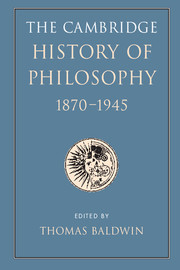Book contents
- Frontmatter
- Contents
- List of contributors
- Introduction
- I 1870–1914
- II 1914–1945
- 8 Logic and philosophy: the analytic programme
- 9 The diversity of philosophy
- 10 Knowledge, language, and the end of metaphysics
- 41 Sensible appearances
- 42 The renaissance of epistemology
- 43 The solipsism debates
- 44 Language
- 45 The end of philosophy as metaphysics
- 11 Philosophy and the exact sciences
- 12 Mind and its place in nature
- 13 Philosophy and social science
- 14 Ethics, religion, and the arts
- 15 Law and politics
- Biobibliographical appendix
- Bibliography
- INDEX
- References
44 - Language
from 10 - Knowledge, language, and the end of metaphysics
Published online by Cambridge University Press: 28 March 2008
- Frontmatter
- Contents
- List of contributors
- Introduction
- I 1870–1914
- II 1914–1945
- 8 Logic and philosophy: the analytic programme
- 9 The diversity of philosophy
- 10 Knowledge, language, and the end of metaphysics
- 41 Sensible appearances
- 42 The renaissance of epistemology
- 43 The solipsism debates
- 44 Language
- 45 The end of philosophy as metaphysics
- 11 Philosophy and the exact sciences
- 12 Mind and its place in nature
- 13 Philosophy and social science
- 14 Ethics, religion, and the arts
- 15 Law and politics
- Biobibliographical appendix
- Bibliography
- INDEX
- References
Summary
Language became a major concern during this period. Moreover, theories of language suggested methodologies for the study of philosophy itself, so that the two topics often became intertwined. A number of main tendencies can be distinguished: whereas at the beginning of the period models suggested by logic and other formal disciplines predominated, by the end there was a growing interest in psychological and sociological approaches, and increasing scepticism about the value of formal models.
LOGICAL ATOMISM
Russell coined this term in a series of lectures given in 1918 (Russell 1918 [1956: 177]). Non-logical expressions are, he argued, either complex or simple. To understand the former one has to understand the simple expressions contained in their analyses. Since complex expressions can be analysed only in the context of analyses of sentences in which they occur, the apparent formof such sentences may be a poor guide to the logical form revealed by analysis (for Russell an important example of this situation arises from his theory of descriptions). Analysis terminates when all the complex non-logical items have been eliminated, and only simple ones remain. To understand these it is necessary to be cognitively acquainted with the items they stand for, which are literally their meanings. So, to understand (S1) ‘This is blue’ one has to be acquainted both with the sense-datum identified by ‘this’, and with the universal blue. A sentence such as (S1) that cannot be further analysed corresponds to what Russell called an atomic fact. The fact to which it corresponds, if true, is of the simplest kind and consists in the possession by a particular of a property.
- Type
- Chapter
- Information
- The Cambridge History of Philosophy 1870–1945 , pp. 554 - 564Publisher: Cambridge University PressPrint publication year: 2003



